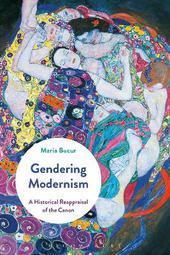
|
Gendering Modernism: A Historical Reappraisal of the Canon
Paperback / softback
Main Details
| Title |
Gendering Modernism: A Historical Reappraisal of the Canon
|
| Authors and Contributors |
By (author) Professor Maria Bucur
|
| Physical Properties |
| Format:Paperback / softback | | Pages:168 | | Dimensions(mm): Height 234,Width 156 |
|
| Category/Genre | Theory of art
Literary studies - from c 1900 - |
|---|
| ISBN/Barcode |
9781350026254
|
| Classifications | Dewey:700.4112 |
|---|
| Audience | | Tertiary Education (US: College) | |
|---|
| Illustrations |
7 bw illus
|
|
Publishing Details |
| Publisher |
Bloomsbury Publishing PLC
|
| Imprint |
Bloomsbury Academic
|
| Publication Date |
21 September 2017 |
| Publication Country |
United Kingdom
|
Description
Gendering Modernism offers a critical reappraisal of the modernist movement, asking how gender norms of the time shaped the rebellion of the self-avowed modernists and examining the impact of radical gender reformers on modernism. Focusing primarily on the connections between North American and European modernists, Maria Bucur explains why it is imperative that we consider the gender angles of modernism as a way to understand the legacies of the movement. She provides an overview of the scholarship on modernism and an analysis of how definitions of modernism have evolved with that scholarship. Interweaving vivid case studies from before the Great War to the interwar period - looking at individual modernists from Ibsen to Picasso, Hannah Hoech to Josephine Baker - she covers various fields such as art, literature, theatre and film, whilst also demonstrating how modernism manifested itself in the major social-political and cultural shifts of the 20th century, including feminism, psychology, sexology, eugenics, nudism, anarchism, communism and fascism. This is a fresh and wide-ranging investigation of modernism which expands our definition of the movement, integrating gender analysis and thereby opening up new lines of enquiry. Written in a lively and accessible style, Gendering Modernism is a crucial intervention into the literature which should be read by all students and scholars of the modernist movement as well 20th-century history and gender studies more broadly.
Author Biography
Maria Bucur is John W. Hill Chair of European History and Professor in the Department of History at Indiana University Bloomington, USA. She is the author of Gender and War in Twentieth-Century Eastern Europe (2006) and co-author of Making Europe: The Story of the West (2nd edition 2012).
ReviewsGendering Modernism definitely opens many new horizons for those who are interested in the evolution of gender norms and its influence on the formation of the modernist canon. * H-SHERA * A useful introduction, contributing to the still very necessary task of keeping feminist issues visible. * Times Higher Education * Written with a rare clarity, concision, and lucidity, Gendering Modernism builds up a rich texture of references and details that cumulatively haul the highly neglected female dimension of modernism out of oblivion. The wealth of references and wide-ranging supportive bibliography give scholarly weight and substance to the three theses, resulting in a work which is a hybrid of essay, programmatic tract, and scholarly history. This highly readable, powerful book is relevant to both modernism and feminism studies, as well as to the cultural and political history of the period 1880-1945. It is rare to see a feminist perspective explored with such a deep sense of ambivalence and complexity, so that it amplifies and enhances traditional narratives instead of exploding them. * Roger Griffin, Oxford Brookes University, UK * In true modernist spirit, Maria Bucur upsets the canon. Just as modernists rejected tradition and created new ways of seeing the world, this thought-provoking book argues that focusing on gender changes how we should evaluate modernism. Was modernism truly revolutionary if many of its practitioners adhered to traditional gender norms? Simultaneously erudite and accessible, Gendering Modernism asks its readers to rethink their fundamental assumptions about modernism and its icons. * Melissa Feinberg, Rutgers University, USA *
|